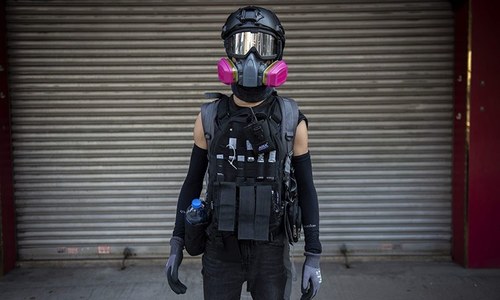Hardline Hong Kong protesters held their ground on Thursday in a university besieged for days by police as the US passed a bill lauding the city's pro-democracy movement, setting up a likely clash between Washington and Beijing.
Beijing did not immediately respond to the passage in Washington of the Hong Kong Human Rights and Democracy Act, which voices strong support for the "democratic aspirations of the Hong Kong people".
But China had already threatened retaliation if the bill is signed into law by President Donald Trump, and state-run media warned on Thursday the legislation would not prevent Beijing from intervening forcefully to stop the "mess" gripping the financial hub.
"Some may expect this to deter Beijing. Such thinking is naive," the Global Times said.
"If we take this US bill seriously and shrink from tackling riots, Hong Kong will suffer from an accelerated collapse of the rule of law and be erased from the modern world."
Hong Kong's benchmark stock index fell 1.56 per cent in morning trade and other Asian markets also slid over fears that Congress's move could throw a spanner into the delicate US-China effort to reach a trade deal between the world's two largest economies.
There was a noticeable reduction in the police presence at Hong Kong Polytechnic University (PolyU), which entered the day fifth day of a stalemate that has emerged as the axis of the city's increasingly angry democracy movement.
Fiery clashes between police and protesters armed with bows, arrows and Molotov cocktails had caused injuries on both sides in previous days and led hundreds of the campus occupants to flee, with most of them quickly arrested by police.
They included two protesters held on Wednesday as they tried to emerge from a sewer around half a kilometre outside the campus.
But a diehard cohort remained entrenched on Thursday, cooking up meals in a canteen from their dwindling supplies.
Makeshift signs at the campus warned people not to smoke near areas where Molotov cocktails were stockpiled.
'Pull back from the cliff'
Hong Kong's nearly six months of turmoil began with a now-shelved bill to allow extraditions to China, which revived fears that Beijing was slicing into the city's freedoms.
Millions of angry citizens have taken to the streets or disrupted the transport network in a movement that snowballed into wider calls for free elections and an inquiry into alleged police brutality, demands that Hong Kong's Beijing-appointed leaders have rebuffed.
The troubles have already tipped Hong Kong's economy into recession and the threat of change in trade status brought fresh gloom.
Hong Kong is a semi-autonomous Chinese region and US policy treats its economy as separate from the rest of China.
That has been a key factor in the city's rise as an international financial hub, and left it exempt from the crippling tariffs imposed by Trump's administration.
The new US bill would require an annual review of that status, which could be revoked if the city's unique freedoms are quashed.
"If the bill becomes law, investors will be hesitant to take on the risk," Hao Hong, head of research at Bocom International, told Bloomberg News.
"There are too many moving parts, it's very tricky."
US and Chinese negotiators are working toward a trade agreement, and markets had rallied in recent weeks on optimism it will be signed off soon.
Beijing has accused the United States of fuelling Hong Kong's protests, and China's state media made clear the government's anger over the Hong Kong democracy bill.
The People's Daily, mouthpiece of the all-powerful Communist Party, called it a "grave provocation".
"We are telling the US side to recognise the situation (and) pull back from the cliff [...] so as not to draw fire against itself," it said.
"If the US clings to its course, China will take strong measures to resolutely counter it, and the US must bear all the consequences."















































